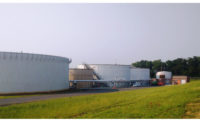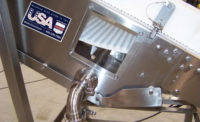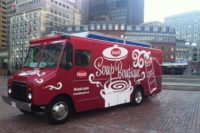Hood is New England’s beloved dairy brand with roots that reach back to 1846 when Harvey Perley Hood founded the company in Derry, N.H. Today, HP Hood LLC, based in Lynnfield, Mass., near Boston, processes branded lines of milk, ice cream, cheese and other dairy products that rank among the best-sellers in the Northeast.
Consumers outside of the Northeast might not know the Hood name, but they certainly know of Heluva Good! sour cream dips and cheese, Lactaid Milk, Hershey’s Milk and MilkShakes, Blue Diamond Almondmilks and Baileys nonalcoholic coffee creamers. Hood produces them all. Its reputation for product development and efficient manufacturing make the company a favorite with licensors and private label accounts.
HP Hood is growing in an industry where there is little growth by concentrating on product formulations and unique processing and packaging technologies. Hood’s annual revenues total about $2 billion, making it the 17th largest dairy processor in North America, according to the Dairy 100, Dairy Foods’ annual ranking. The company has 15 manufacturing plants throughout the United States. (See chart on page 98.) In 2007, it acquired a facility in Sacramento, Calif., to be closer to West Coast customers. (See related article on page 104.)
The company produces Hood-branded lines of milk, cream, ice cream, cottage cheese and sour cream. Its family of products also includes Simply Smart (milk), Heluva Good! (sour cream dips, hard cheeses, condiments), Crowley Foods (milk, cream, sour cream, cottage cheese and yogurt), Penn Maid (sour cream, cottage cheese, cream, yogurt, cheese), Rosenberger’s Dairies (iced teas and juices, milk, cream), Axelrod (yogurt, sour cream, cottage cheese), Maggio Cheese, Hagan Ice Cream, Green’s Ice Cream and Brigham’s Ice Cream. In 2011, it sold the Minnesota-based dairy processor Kemps (which it had acquired in 2004) to Dairy Farmers of America.
Hood has national and super-regional franchise rights to process and sell extended-shelf-life products including lactose-free Lactaid milk and other dairy products (ice cream, cottage cheese), nonalcoholic Baileys coffee creamers, Hershey’s Milk & Milkshakes and Almond Breeze Almondmilk.
The goal of any processor is to keep the filling and packaging lines running around the clock because an idle machine drives unit costs up. Hood has found a way to keep its processing plants humming. In addition to making products for its own brands, the company manufactures dairy foods and beverages for others. Co-packing and manufacturing licensed and private label products account for the majority of sales. Only about 40% of the output is Hood brands.
Developing new dairy products
The company has a pilot plant and research-and-development innovation center in the Boston area where it formulates dairy and nondairy products. Hood worked with the Blue Diamond cooperative to develop the almond milk beverage. The Baileys coffee creamer line was developed by the R&D team “from scratch,” said John A. Kaneb, chairman, president and CEO of HP Hood. The creamers come in 12 flavors — The Original Irish Cream (also fat-free), French Vanilla (also available in a fat-free version), Hazelnut, Caramel, Crème Brulée, Toffee Almond Cream, Chocolate, Triple Sweet Cream, Latte Macchiato and Brown Butter Pecan.
Besides product formulations, the R&D center works on processing techniques. For the Simply Smart products, Hood removes 20% of the water from raw milk. Because of the reduced water content, the 1% and fat-free milks have the mouth feel of higher-fat products, Kaneb said.
Hood and Dairy Farmers of America acquired Crowley and Kemps in 2004 from National Dairy Holdings. Hood swapped its interest in Kemps for 100% ownership of Crowley in 2011. The Crowley acquisition brought expertise in cultured dairy products to Hood, said executive vice president Jeffrey J. Kaneb, and offered synergies between the two dairy companies.
Crowley also gave Hood insights into the private label and foodservice markets, said James F. Walsh, executive vice president of sales. “They complement what we do,” he said.
“We’ve bolstered our regional brands,” Kaneb said. Hood’s growth has come from increasing sales of existing products, expanding the customer base and developing new products, he said.
Hood has been expanding its distribution of branded and licensed products. In September 2011, Hood gained national exposure for the Baileys products when it began selling them in the West. In February 2011, Hood expanded Heluva Good! west of the Rocky Mountains.
Heluva Good! sour cream dips are the leading brand of dips in the country. The brand seeks to stay fresh by developing new flavors, something it has done every year since 1997. Dairy Foodsselected the black bean queso variety as one of the best new dairy products of 2012.
In the cheese category, the Heluva Good! brand last year introduced Bold, a line of flavored naturally aged cheeses. Sold primarily in the Northeast and Midwest, the new flavors are Chipotle Cheddar, Habanero jack and a special reserve extra sharp Cheddar.
For the 2012 winter holiday season, Hood developed a new limited-edition Caramel EggNog. Hood had reviewed flavor trends research that found caramel to be among the top 10 flavors in the “Sweet Flavors” and “Beverage Flavors” categories.
“Caramel has long been a popular flavor in foods and beverages, and we are thrilled to introduce it into our EggNog line,” said Lynne Bohan, a company spokesperson.
In its New England Creamery ice cream line, Hood’s new flavors in 2012 were Down East Double Fudge Brownie and Mt. Washington Chocolate Peanut Butter Cup. It also added new flavors to its Red Sox novelties, Hood Classic and ice cream sandwich lines.
Sales and marketing
Hood takes a customer-centric approach to selling. Rather than telling prospects what they have, the dairy processor asks customers what they want, said Walsh.
“We look to add incremental consumption” and to give customers a solution so that “consumers buy on the dealer, not the deal,” Walsh said. “When you focus on solutions, then the products become top of mind.”
Lactaid milk is one such solution. Millions of Americans avoid milk because of lactose intolerance. By removing the lactose from the milk, Hood has grown Lactaid into the nation’s largest milk brand.
Hood’s customers are chain and independent retailers, convenience stores and foodservice channels nationwide. Hood’s sales pitch is “high-quality products that taste great, driven by a history of innovation.” Each brand has its own advertising tactics, but in general, Hood uses newspaper, radio, television and digital advertising, as well as coupons (delivered in free-standing inserts and online).
Hood tends to support its products with consumer recipes. For example, in addition to serving eggnog as a beverage, Hood suggests its use as an ingredient in pancakes, bread puddings and creme brulee. Hood offers recipes on its website.
To promote the use of cream in soups, Hood outfitted a food truck that toured Boston, Portland, Maine, and Providence, R.I. Working with local chefs, Hood developed cream-based soups, served samples and distributed recipe cards at tour stops during the 11-day tour in November and December 2012. The so-called “Soup Boutique, Inspired by Hood Cream” food truck event included a contest and a charitable component. To win a prize pack that included a $100 restaurant gift card, Twitter followers had to respond to a question and use a special hashtag. (Entry was also online.) For every sample it distributed on the tour, Hood donated $1 to local food banks..
Perhaps Hood’s signature event is the four-year-old New England Dairy Cook-Off that awards a top prize of $10,000 to an amateur chef who creates a recipe with at least one Hood dairy product. The six finalists (one from each New England state) have 60 minutes to prepare his or her dish, which they then serve to a judging panel. In 2012, the cook-off was held at the Rhode Island Convention Center in Providence. The winning recipe, by Mary Jo Fletcher LaRocco, was Cranberry Limoncello Tarts in a Gingersnap Hazelnut Crust.
In the social media sphere, Hood maintains a presence on Facebook and Twitter. Its own Facebook page has about 19,000 “likes.” Other Facebook pages maintained by Hood include Baileys Coffee Creamers (about 139,000 likes) Heluva Good! (82,000), Blue Diamond Almond Breeze (75,000), Lactaid (30,000) and Simply Smart Milk (13,000).
Looking for opportunities
John Kaneb, who said he, his wife and children were all raised on Hood milk, always keeps Simply Smart milk in the refrigerator and Hood ice cream in the freezer. His father founded an oil distribution business in 1933 which the family continues to operate today. They entered the dairy business when they bought Hood in 1995.
He called the dairy industry “more fun than oil.” The company holds memberships in the International Dairy Foods Association, the Milk Processor Education Program and the Innovation Center for US Dairy.
MilkPEP’s Donna Armstrong said Hood has been particularly active in its Halloween and Refuel with Chocolate Milk promotions. Refuel is a title sponsor of the Rock N Roll Marathon and Ironman Triathlon series. In fact, Gary Kaneb, Hood’s CFO, completed both the Lake Placid and the Ironman World Championship Triathlon in Hawaii in 2012 as a member of Team Refuel.
Assessing the dairy categories, John Kaneb is blunt. Fluid milk “is not a growth business,” he said, blaming the federal pricing system that keeps prices higher for Class I milk than for other uses. It’s a complaint commonly expressed by many other fluid milk processors as well.
Meanwhile, Kaneb said yogurt is “growing” in the cultured category. And mozzarella cheese (a product not made by Hood) “continues to grow,” spurred by the demand for pizza. Ice cream novelty sales are growing, but packaged ice cream is not, he said.
Since buying Hood, Kaneb has taken the company from a regional business to one stretching from coast to coast. Revenues have increased from $600 million to $2 billion. Asked about his three- to five-year goals, Kaneb professed to have no long-range plans for the company. Instead, he says he reacts to opportunities.
“I don’t look too far ahead. I look widely, scanning the horizon like a submarine skipper, looking for targets,” he said (Kaneb is a Navy veteran).
One target is Greek yogurt. It would be safe to say that five years ago, no full-line dairy processor was thinking about Greek yogurt. But when the opportunity came up to manufacture a private-label product, “we figured out how to do it in nine months,” Kaneb said. Hood’s R&D center developed the formula and the plant in Vernon, N.Y., produces the product. “We are prospering in the slip stream of [market leader] Chobani.”
The growth in private label dairy products is “regrettable in some respects because it is growing at the expense of the branded business,” Kaneb said, but “it’s there,” so Hood will take advantage of the trend and continue to manufacture products for those customers.
Despite Kaneb’s statement about not looking too far into the future, one can see Hood’s long-range strategies by looking at the investments he is making in the production facilities. Hood sees a need and a demand for extended shelf life products so it is adding filling capacity at ESL plants in Sacramento, Calif., Oneida, N.Y., Philadelphia and Winchester, Va.
Aseptically packaged beverages like energy drinks, meal replacement beverages and body building drinks have a future. The single-serve portion sizes are “useful for the on-the-go civilization we live in,” Kaneb said.
In the community
For more than 160 years, Hood has been committed to supporting the communities in which it conducts business. Since dairy plays an important role in achieving good health, the company’s community support efforts are focused on organizations that assist children and their families in the areas of health and nutrition.
“Hood has a long tradition of being a constructive citizen. Give credit to the Hood family. We stand on their shoulders,” Kaneb said. He and several family members serve on educational, charitable and healthcare organization boards both locally and nationally.
Among the causes Hood supports are The United Way, Red Sox Foundation (Hood is the official ice cream of the baseball team and Kaneb is a part owner), The Jimmy Fund, local food banks (through America’s Second Harvest), and educational and enrichment programs for families at the Boston Children’s Museum and the Children’s Museum of Maine.
Hood, along with 25 or so other ice cream companies, participates in the annual Scooper Bowl that raises funds for The Jimmy Fund, which seeks a cure for pediatric cancers. Every June, the ice cream companies set up tents in Boston’s City Hall Plaza, and for a $10 donation, it’s all you can eat. Hood was one of two ice cream companies that provide refrigerated trailers for storage during the three-day event.
In 2010, Hood started the Sportsmanship Scholarship program, which gives $5,000 awards to 18 high school student athletes in New England attending a two- or four-year accredited college or university.
What next?
Kaneb said he sees a similarity between oil and milk. Both are commodities, he said. But really, Hood does not sell commodities; it sells value-added foods and beverages that stand out against the competition. In licensed products, for example, it leverages a well-known brand — Baileys — to add value to coffee creamers. Hood’s value-added Simply Smart low-fat and nonfat milks offer more calcium and protein than whole milk.
New England consumers love their Hood products. Hood’s customers — other dairy brands, private label accounts and licensors — love the efficiencies and nationwide reach the dairy processor brings to manufacturing. HP Hood offers plenty to all.
See a photo album of products made by Hood on our Facebook page. Go to www.facebook.com/DairyFoods.
Facilities on both coasts
Processing plants (products)
California: Sacramento (aseptic and UHT fluid products)
Connecticut: Suffield (ice cream, novelties, frozen desserts)
Maine: Portland (milk, juice, drinks)
Massachusetts: Agawam (milk, juices, drinks)
New Hampshire: Concord (milk, juice, drinks)
New York: Arkport (cultured), LaFargeville (cultured), Oneida (UHT fluid products), Sodus (Heluva Good! cheese), Vernon (cultured), Wolcott (Heluva Good! cheese and spreads)
Pennsylvania: Hatfield (Rosenberger’s milk, juice, drinks), Philadelphia (UHT fluid products)
Vermont: Barre (milk)
Virginia: Winchester (UHT fluid products)
Source: HP Hood











